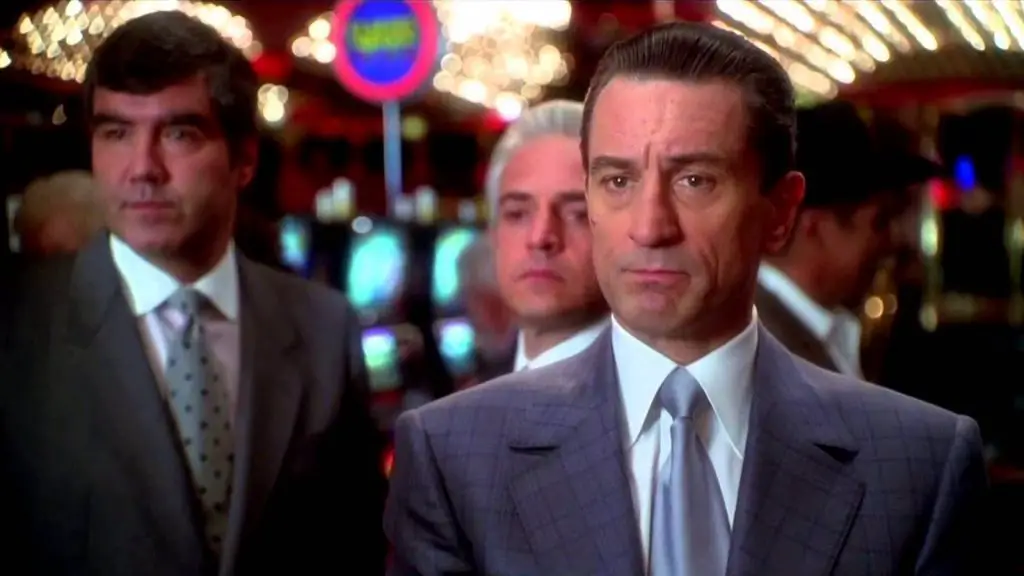
If “Matrix Revolutions” was a hardcore porno film, it would be a succession of “money” shots. Not in my memory has a film been filled with a succession of ejaculatory FX shots that cover any semblance of story in goo. Forget Terminator 3. “Matrix Revolutions” is the real rise of the machines, the ultimate triumph of visuals over narrative. And as such, a stunning, crushingly disappointing ending to what could have been the post-punk answer to The Lord of the Rings trilogy. Watching it, you feel like Dorothy after she’s pulled back the wizard’s curtains. But there’s no lovable geezer behind the curtains. Rather, an insane producer and two directors who’ve completely blown their minds on all the visual FX toys that money can buy. There are few answers for the people who so desperately waited in line to find out how to get back to Kansas. Rather, it’s an e-ticket to ILM with a few cursory explanations on the back. “Revolutions” is a voyage that’s worth taking in spite of itself to find out how the damn thing wraps up, but you can’t help but feel resentful by the end of it.
Those who faulted Reloaded for its endless metaphysical gobbledygook will actually find themselves missing it here. “Revolutions”‘ lines are even more fortune cookie in their maddening “can you guess what I’m talking about” minimalism. And when the action starts, there’s no talk at all. Like Reloaded, the first half hour of “Revolutions” is a gabfest, with characters stumping like political candidates, promising much without answering anything. Virtually all of this is done within the Matrix, which doesn’t make an appearance until the ending. And the trip is nothing to write home about. A shiny, minimal train station, an S & M club that’s even more defanged than Reloaded‘s sweaty rave. Even Lambert Wilson’s wonderfully mincing Mergovician is pale here, with remote interest provided by “Road Warrior”‘s Bruce Spence as a train program who owes more than a bit to Vincent Schiavelli’s more flavorful turn in “Ghost.” Only Mary Alice as a new Oracle is able to give some dignity to the empty platitudes that stand for the Warchowski’s keys to the kingdom.
And upon the return to the real world, the battle of the machines starts. And goes on. And goes on. And goes on. To the point where Neo and Trinity vanish for what seems to be an hour. Imagine one of the fights in Jedi not cutting away, and you’ll get the idea. Sure the visuals are amazing. Some of the best committed to screen. The kind of stuff that sucks the air out of your lungs with the sheer imagination on hand. But the sheer relentlessness of it all ultimately becomes tedious, numbing, then angering. Where are the characters? As an equally disgruntled friend put it, “they’re guest stars in their own movie.” Tools to pilot the FX with. “Revolutions” cardinal sin is in exhibiting none of the wit or storytelling of the first film. Hell, even the second film.
“Revolutions” ends with a cosmic battle that’s so cool that you can’t help but imagine Superman or Ultron in the characters’ places. Anyone but the characters on hand, who throw seventy punches when they could get by with ten. Yet for how great all the airborne stuff is, the hand-to-hand combat is boringly staged, about one step above Reloaded‘s teahouse fight. And by the end, you just want Neo and Smith to get it over with. To reach some frigging answer. An explanation. And when it “comes,” the sentiments are pure cyberpunk Hallmark card quality.
There is no victory without sacrifice. But the sacrifices in “Revolutions” seem unusually hollow. Unworthy. Almost cheap. If this had the greatness of Wagnerian opera, it would work- a la Ripley’s plunge into the furnace at the ending of “ALIEN3”- a far more interesting third film than this. But “Revolutions” is so committed to its spectacle that the sudden injection of tragic humanity seems like an arbitrary afterthought. It pisses you off rather than makes you feel.
While Reloaded never quite worked, there was a kind of crazy-quilt greatness to it. Without enough neatness to almost make you forgive the flaws. “Revolutions” amounts to one great big “huh?” Joel Silver, a producer prone to spectacles of the best and worst kind, has given the Warchowskis the run of the ship. And they’ve just plain gone crazy,. “The Matrix” may not have had an original bone in its body, but it somehow made everything new again with a sense of character-driven imagination that turned this into one of the best science fiction films ever. And the Warchowskis probably should have stopped there. If the Matrix Reloaded worked because of the expectations it set up, “Matrix Revolutions” stumbles under the weight with all of the technical possibilities that Silver’s money can buy. And the Warchowskis have run it into the ground with their ejaculatory reliance on FX. Somehow, Neo, Trinity and Morpheus are still lost in the matrix, despite the film’s “finality.” Indeed, The Phantom Menace seems like a triumph of character development in comparison to “Revolutions.” And probably the saddest thing about these two “Matrix” sequels is that there’s far more imagination and personality afforded to the Warchowski’s concepts in The Animatrix. Perhaps “Revolutions” would have worked in anime, but not when you want flesh and blood from the people you’ve grown to care about. And the directors who handle humanity with the precision of a computer animator.
Disagree with this review? Think you can write a better one? Go right ahead in Film Threat’s BACK TALK section! Click here>>>
